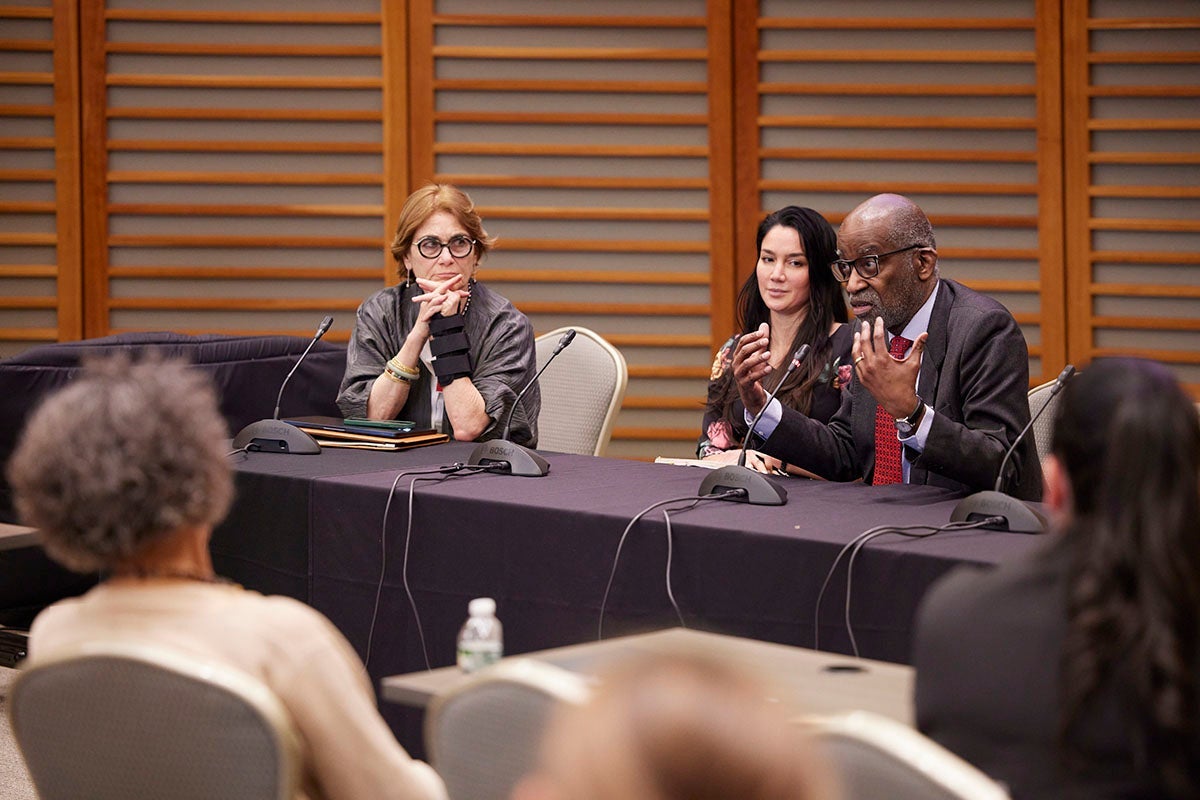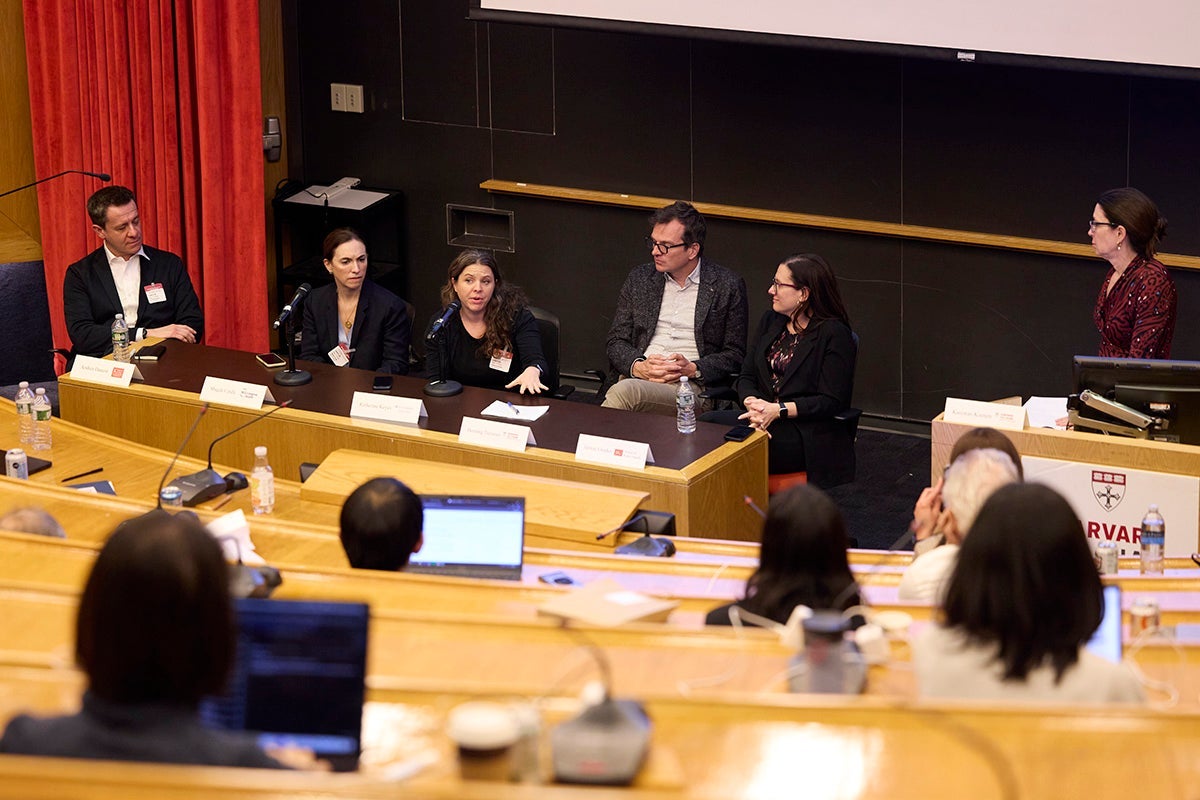Conference explores link between anti-Roma racism and health disparities

April 12, 2023 – In 2021, average life expectancy for people in the European Union was about 80 years. But for Roma people, it was 10 years shorter.
That statistic and other sobering facts about the repercussions of anti-Roma racism were discussed at the 11th annual Roma Conference at Harvard T.H. Chan School of Public Health, held April 6. The conference focused on how Roma people in Europe—like Blacks and Hispanics in the U. S.—experience considerably worse health outcomes than ethnic majorities.
Scholars and advocates gathered at Harvard Medical School’s Joseph B. Martin Conference Center to explore the reasons for the health disparities and to chart a course for rectifying them.
“Roma people have been cloaked in silence in many ways, not just within the field of public health, but around the world,” said opening speaker Mary Bassett, director of the François-Xavier Bagnoud (FXB) Center for Health and Human Rights, which hosted the gathering. The FXB Center’s Roma Program, Bassett noted, is one of the largest programs focusing on the Roma at a school of public health.
The conference featured several panels that included Harvard scholars as well as international experts on Roma history and health.
In the keynote panel, titled “Racism, A Health Emergency,” Jacqueline Bhabha, professor of the practice of health and human rights at Harvard Chan School, noted that the ambitions of the conference have grown over the past decade, from addressing “the radical ignorance among U.S. scholars, activists, anti-racists, and political scientists about who Roma were,” to showing how anti-Roma racism and discrimination are connected to negative health outcomes. David Williams, Florence Sprague Norman and Laura Smart Norman Professor of Public Health, detailed research showing that disparities facing minorities worldwide—in infant mortality, heart disease, cognitive impairment, and other health issues—are associated not just with socioeconomic differences but with racist and discriminatory practices in medical systems.

A second panel featured historians who detailed the long history of discrimination and violence against Roma people. Marius Turda of Oxford Brookes University in the U.K. described the history of eugenics in the U.K., U.S., and Europe that labeled ethnic minorities, including the Roma, as inferior. Such labeling led to sterilizations and murder of Roma people at the hands of the Nazis during World War II, said Turda, who also prepared an exhibit on eugenics and dehumanization that was on display outside the conference hall. Dalen Wakeley-Smith, a Charles Warren Center for Studies in American History Postdoctoral Scholar at Harvard, spoke about discrimination against American Romani people in New York City in the late 19th and early 20th century.
During the final panel, scholars explored the connection between discrimination against Roma people and the health disparities they experience. For example, Romani educator, clinician, and activist Petra Gelbart of Czechoslovakia noted that Roma women in that country die 18 years earlier and are twice as likely to experience high-risk conditions such as diabetes and hypertension compared to the national average. In her work gathering stories from Roma children who had previously been in orphanages, she found that the children were sometimes denied mental health services, based on the idea that their problems were caused by “Roma genetics” or “gypsy temperament” rather than trauma or prenatal alcohol exposure. Even a recent nursing textbook perpetuates racist depictions of Roma women, calling them “hot-tempered” and neglectful of their own health, Gelbart said.
Romanian feminist, activist, and scholar Carmen Gheorghe presented further evidence of racism by health practitioners towards Roma women. The women whom she and colleagues interviewed were sometimes called “dirty” or promiscuous or even referred to as animals, yet they were often afraid to speak up about negative or inadequate care they received. Márton Rövid of the Romani Studies Program at Central European University in Vienna discussed Roma people’s shorter life expectancy compared with the EU average. And even though a 2015 survey found that 30% of Roma people reported discrimination in the health care system, health leaders throughout Europe have only staged small-scale interventions to train Roma health practitioners, rather than addressing deep-seated racist beliefs, Rövid said.
Commenting on the day’s presentations, Nancy Krieger, professor of social epidemiology at Harvard Chan School, said it was both “infuriating and tedious” to hear about racist practices affecting health in marginalized populations around the world; at the same time, she noted, “historical specificity matters to understand the health of any particular group” such as the Roma, “and that’s what these data show.”
In closing remarks, Harvard Chan School’s Margareta Matache, director of the Roma Program, said, “To date, I would say that no government has taken an anti-racist approach to tackle [anti-Roma] health inequities.” In addition, she noted that, often, academic research on health outcomes emphasizes the role played by genetics, demographics, or behavior, rather than the impact of racist practices. “One of the ways forward includes scholarship on how anti-Roma racism in various forms—from structural to individual to behavioral—has shaped health outcomes and health inequities,” she said. “These approaches should be added to or should replace some of the existing research models.”
Photos: Kent Dayton


